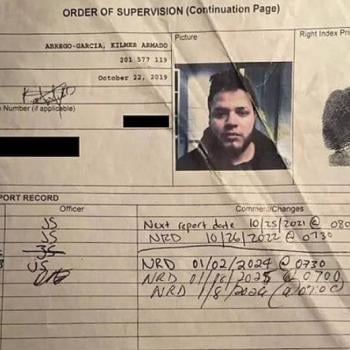This week a lot of the big news has been about the Supreme Court once again. The president has been hell-bent on deporting as many illegal immigrants as possible. He’s even invoked the nearly 200-year-old Alien Enemies Act to justify his rapid deportation of immigrants that he has labeled as dangerous.

However, the court did give the president one stipulation, the immigrants had to be given notice of deportation and the due process to contest the deportation. The Supreme Court is becoming increasingly more political, than judicial by empowering the president over fulfilling its intended roles:
- Interpreting the Constitution
- Interpret federal laws
- Review lower court decisions
- Ensure rule of law
It is easy to see why judgment is crucial as we continue to endure these last days in this earthly kingdom. Jesus in the New Testament writers warned us about false teachers and false prophets in the last days to deceive God’s people and lead them astray (Matthew 7:15, 2 Timothy 4:3-4, 2 Peter 2:1).
The Bible warned us about those who spread feel-good lies and divisive conspiracy theories (Acts 23:12-13, 1 Timothy 4:1-7). That is why discernment and judgments are important in the last days (1 John 4:1).
What is Judgment
Judgment and judging often have a negative connotation associated with them, but they’re actually healthy practices in life. Since we live in a fallen world, we must judge or discern between good and evil.

Judgment is defined as, “The process of forming an opinion or evaluation; discernment.” We all must make use of judgment at some point in our lives. When I was younger I had bad judgment and made a lot of bad decisions.
After my accident, I learned the art and principle of listening to God’s teaching about wisdom, judgment, and how to make better decisions. The Bible has a lot to say about judgment and judging, for ourselves and others (Romans 16:17-18, 1 Corinthians 2:15, James 4:11-12).
We need to be careful who we listen to and spend time with (Proverbs 13:20, 1 Corinthians 15:33). We must be careful how we judge others because God will judge us by those same standards (Romans 2:1-3, James 2:13).
One day we will all stand before the judgment seat of God who will judge us for eternity (Romans 14:10-12, 2 Corinthians 5:10, 1 Peter 4:5, Revelation 20:11-15). The apostles remembered their Jewish education about God’s judgment.
Mišpāṭ
The ancient world was a corrupt and dark place. People chose to live how they wanted and pursue temporary pleasure in this earthly kingdom. They didn’t know or care that God’s judgment would come one day.
The Hebrew word in the Old Testament for judgment is Mišpāṭ and it can also mean, “Ordinance, discretion, law, or justice”, depending on the context it is used in. God’s judgment is coming upon this world one day, that is why God called His people out of the darkness to be a nation dedicated unto Himself (Exodus 19:6, Deuteronomy 7:6).
Because of God’s love and mercy, He gave His people guidelines for judging others in this fallen world (Exodus 22:2-3, Leviticus 19:15, Deuteronomy 1:17; 6:19).
- Judge fairly
- Be impartial
- Avoid personal opinions
- Be compassionate
- Have mercy

Jesus had a lot to say to His followers about judging others and God’s judgment (Matthew 7:1-5, Luke 6:37, John 7:24). Jesus reaffirmed that God will judge us how we judge others (Matthew 6:14-15; 7:2, Luke 12:47-48).
He taught His disciples to be loving and compassionate (Matthew 5:7, Luke 6:36, John 13:34-55). Jesus warned His followers that God will judge us all one day (Matthew 12:36-37; 25:31-46, John 12:48). We judge lovingly, we don’t condemn. We use our judgment and the Word of God, not our wants or standards to judge others.
Lent
Today as we begin this last week of Lent and prepare for Holy Week; we should remember that this season has been a time of reflection in preparation for the Easter season and the Kingdom to come.

The season of Lent has a way of humbling us. Lent should convict us of our wrongs and lead us to repent. Our convictions should help us make better choices and use better judgment and how we treat others. We should remember our goal is to become more like God and less like this fallen world that God will judge soon.
- Loving
- Patient
- Faithful
- Forgiving
- Humble
It is easy it caught up in the ways of the world and take our eyes off of God. Lent helps us to focus and prioritize our lives. One of the biggest takeaways this year for me during this season of Lent is to discern and judge what God wants me to do and how I need to treat others, especially those who disagree with me.
I also know that is better to let God be the judge of the world, than trying to judge it myself. There is nothing wrong with correcting each other in love, but we need to let God judge others (1 Corinthians 13:4-8, Galatians 6:1, 2 Timothy 3:16-17). It is better to love quickly than to judge hastily because we all stand before God’s Mišpāṭ!

















